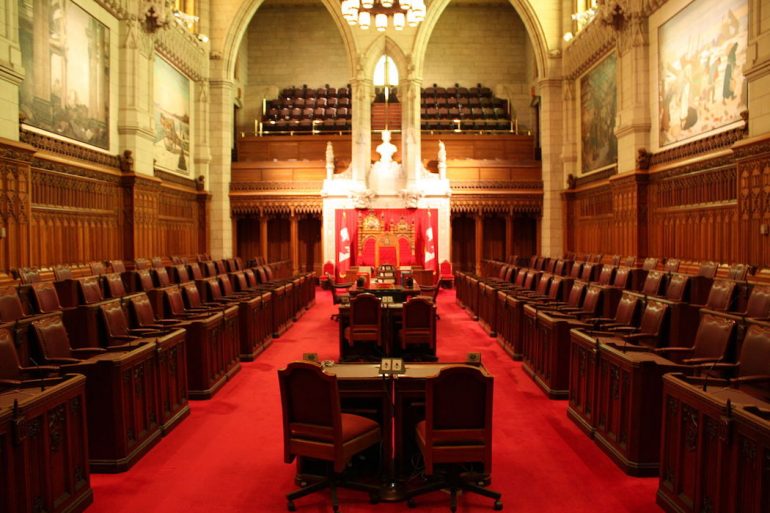The Liberal Party of Canada’s proposed changes to the Canada Emergency Wage Subsidy (CEWS) passed in the Senate Monday. The new changes extend the program to the end of the year and make the subsidy proportional to revenue declines, meaning a business with any revenue decline, regardless of revenue decline percentage, will be eligible for the CEWS. The bill has now received Royal Assent and has therefore been passed into law.
Major changes include a deadline extension of the CEWS to the end of the year and a new sliding scale for businesses to show revenue decline.
The new bill, C-20, passed in the House of Commons on Tuesday at third reading, four days after the federal government noted the changes it would propose to the CEWS program, which is aimed to re-hire workers who lost employment as a result of the COVID-19 pandemic. The bill included a number of COVID-19 measures, but major changes to the CEWS proposed by the Liberals include the deadline extension, as well as eliminating the requirement that businesses meet a revenue decline of 30 percent in order to qualify for the subsidy.
Initially proposed for a 12-week period, from March 15 to June 6, the federal government added 12 weeks to the program in May, extending eligibility to August 29. The new bill extends the program until November 21, with the possibility of further extensions until December 31. The new submission deadline for all payroll periods is now January 31. The new changes will also break the CEWS into two parts:
1. A base subsidy for all eligible employers experiencing revenue declines, with the subsidy amount determined based on the amount of revenue decline on a sliding scale.
2. A top-up subsidy of up to an additional 25 percent for employers with more than a 50 percent revenue decline.
Bill #C20 has been adopted at third reading in the Senate: https://t.co/EHVWyAZ0sN #SenCA #cdnpoli pic.twitter.com/UsI28uF3Yr
— Senate of Canada (@SenateCA) July 27, 2020
From July to November, businesses with any revenue decline will be eligible to participate. Bill C-20 also increases the maximum of subsidy available for businesses with higher revenue declines from $847 to $960 per employee. The government will gradually decrease the maximum subsidy amount available in September.
Under the wage subsidy program, employers were previously subject to a 30 percent revenue decline measurement, which made them eligible for a payroll subsidy of 75 percent. That eligibility requirement was criticized by business groups and other federal parties calling for the government to make the wage subsidy more accessible for businesses, including pre-revenue startups that were less likely to be able to meet the 30 percent revenue decline requirement.
RELATED: Tech sector reiterates calls to expand wage subsidy as Canadian government asks for feedback
One survey of the Canadian tech community in June indicated more than half of respondents were still ineligible for the CEWS, despite the federal government relaxing some of the revenue criteria in April.
In May, the federal government began consultations on the CEWS, which closed on June 5. The consultations were aimed to help inform potential changes to the program, and although changes were expected last month, they were delayed as the federal parties could not come to an agreement.
To date, approximately 269,000 employers have accessed the CEWS, 724,000 have been approved, and the federal government has paid out a total of $22.6 billion.
Last week, when C-20 was being debated in the House, the Conservative party argued the government’s proposed changes to the subsidy were too convoluted, with opposition leader Andrew Scheer saying the party would continue to call for changes to “make sure no one falls through the cracks.” The Bloc Quebecois backed the bill, with House leader Alain Therrien noting the proposed measures fell in line with the Bloc’s prior demands.
RELATED: Canadian government looking to waive 30 percent revenue decline criteria for 75 percent wage subsidy
Despite calls from the tech community to look at other measures of how companies had been impacted by COVID-19, under the new legislation, companies must still have some form of revenue in order to qualify for the CEWS, meaning pre-revenue tech startups will continue to be ineligible.
In a recent conversation with BetaKit, Minister of Innovation, Science, and Industry, Navdeep Bains indicated an openness to extending the now fully-committed National Research Council of Canada’s Industrial Research Assistance Program (IRAP) COVID-19 Innovation Assistance Program (IAP). The IRAP IAP was available specifically for pre-revenue companies that did not qualify for the CEWS.
Also included in C-20 was a one-time $600 payment to Canadians with disabilities, which the government expects to “assist with additional expenses incurred during the pandemic.”
Developing…
With files from Meagan Simpson.
Image source Wikimedia Commons.


